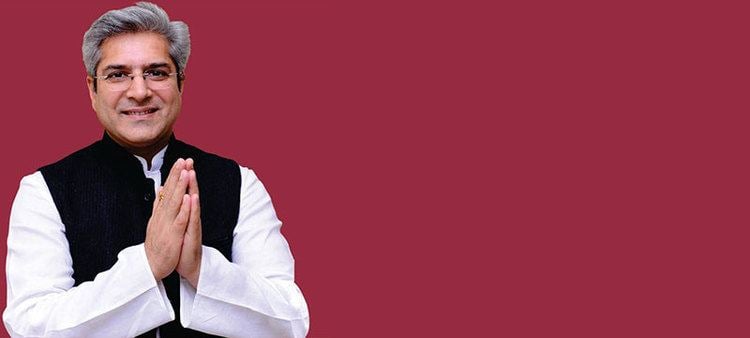


In a shocking move, former Delhi minister Kailash Gahlot joined the BJP after quitting Aam Aadmi Party, citing "grave challenges" within the party. He accused the party of prioritizing their own political agenda over fulfilling promises made to the people, including the transformation of Yamuna river. He also took a dig at AAP's leader Arvind Kejriwal, referring to controversies like the Sheeshmahal. Gahlot's move has raised doubts on whether the party still stands for the "aam aadmi" or common man.
Kailash Gahlot Leaves AAP, Raises Questions on Party's Commitment to 'Aam Aadmi'
In a significant development, former Delhi Minister Kailash Gahlot has resigned from the Aam Aadmi Party (AAP) and joined the Bharatiya Janata Party (BJP). Gahlot's move has sent shockwaves through the political landscape and raised questions about the future of AAP.
Background:
Kailash Gahlot had been a prominent member of AAP since its inception in 2012. He served as the Minister for Law, Justice & Legislative Affairs, and Transport in the Delhi government. Gahlot was known for his work on the Yamuna river rejuvenation project and for pushing for legislation to enhance transparency and accountability in governance.
Reasons for Leaving AAP:
In his resignation letter, Gahlot expressed his concerns about the "grave challenges" within AAP. He accused the party of prioritizing its own political agenda over fulfilling promises made to the people. Specifically, he cited the party's failure to transform the Yamuna river as an example of broken promises.
Gahlot also took a dig at AAP's supremo, Arvind Kejriwal, referring to controversies such as the "Sheeshmahal" incident. The Sheeshmahal controversy involved allegations that Kejriwal had spent excessive funds on renovating his official residence.
Move to BJP:
After resigning from AAP, Gahlot joined the BJP. He cited his belief that the BJP was better positioned to address the challenges facing Delhi and India. Gahlot's move has been welcomed by the BJP, which sees it as a major boost to its presence in Delhi.
Implications for AAP:
Gahlot's departure is a setback for AAP, which has faced a series of setbacks in recent years. The party has been criticized for its handling of the Delhi Assembly elections in 2020 and its failure to deliver on key promises. Gahlot's move raises questions about the party's commitment to the "aam aadmi" or common man.
Top 5 FAQs and Answers:
Q1: Why did Kailash Gahlot leave AAP? A: Gahlot cited "grave challenges" within AAP, including the party's failure to fulfill promises and its focus on political agenda.
Q2: What controversies did Gahlot refer to in his resignation letter? A: Gahlot referred to the Sheeshmahal controversy involving the alleged excessive spending by Arvind Kejriwal on his official residence.
Q3: Which party did Gahlot join after leaving AAP? A: Gahlot joined the Bharatiya Janata Party (BJP).
Q4: What implications does Gahlot's move have for AAP? A: Gahlot's departure is a setback for AAP and raises questions about the party's commitment to the "aam aadmi."
Q5: What is the BJP's reaction to Gahlot's joining? A: The BJP has welcomed Gahlot's move as a boost to its presence in Delhi.

Union Home Minister Amit Shah spoke at the inauguration of the 60th DGsP/IGsP conference in Raipur where he stated that Naxalism in India will be fully eliminated before the next conference. He also highlighted the government's efforts in strengthening the security grid and providing permanent solutions to long-standing national security challenges. Shah emphasized the importance of intelligence and collaboration with agencies to tackle drug trafficking and organized crime. He also mentioned the strengthening of India's policing framework, making it amongst the most modern globally.

In a recent Q&A session, Professor Michael Clarke addressed the impact of a leaked call between Donald Trump's envoy and Russia on peace talks. He also discussed Putin's desire for a great legacy, which has led to a lack of pragmatism. According to Clarke, approximately 4,000 main battle tanks and 30,000 pieces of armoured equipment have been destroyed in the conflict, with Russia focusing on building more complex modern tanks. Don't miss out on these insightful answers from the expert.

Following his party's disappointing performance in the recent Bihar Assembly election, politician Prashant Kishor has raised concerns about the voting results, stating that they did not align with the public sentiment he witnessed during his campaign. Despite this setback, Kishor remains determined to build a stronger political organization and continue engaging with the public in preparation for future elections. He also addressed criticisms of his role as an election strategist, reminding critics that one loss does not define his political future.

Indian government under the leadership of Prime Minister Narendra Modi has introduced four new labour codes aimed at protecting the rights and well-being of 40 crore workers across the country. Union Minister Mansukh Mandaviya has hailed the move as transformative and a major step towards ensuring the welfare of the workforce. The new codes bring in much-needed changes such as formalisation and transparency through appointment letters, and universal social security coverage for all workers including gig and platform workers.

In Uttar Pradesh's Lakhimpur Kheri, a police constable is in hot water for allegedly forging a court order to clear his name in an old case, with the intention of securing a promotion. The fabricated document surfaced during an internal investigation, prompting authorities to file a fresh case against the constable. This incident adds to the growing issue of corruption and misuse of power within the police force.

The Supreme Court has directed the formation of a Special Investigation Team (SIT) to conduct a fact-finding inquiry against Vantara, an animal rescue and rehabilitation center in Gujarat, following allegations of non-compliance with laws and acquisition of animals. The SIT, headed by former apex court judge J Chelameswar, will also look into reports of irregularities and complaints from NGOs and wildlife organizations. Vantara has assured full cooperation to the probe and reaffirmed their commitment to animal welfare.

The ongoing family feud within the Rashtriya Janata Dal (RJD) continues to escalate as three more daughters of party patriarch Lalu Prasad Yadav have left the family residence in Bihar's capital Patna. This comes just a day after another daughter, Rohini Acharya, publicly denounced the family and quit politics following the party's poor performance in the recent elections. Amidst allegations of insults and mistreatment, the saga continues to unfold within the Yadav family.

In a special lecture series in Bengaluru, RSS chief Mohan Bhagwat emphasized on the Hindu identity as a responsible and proud son of Bharat Mata. He urged the Hindu society to come together and share the message of 'Vasudhaiva Kutumbakam' with the rest of the world. Bhagwat also recalled the RSS founder and its journey of facing opposition and growth through dedication and sacrifice of its volunteers.

As the West Bengal Assembly elections near, the political battle between Bharatiya Janata Party (BJP) and Trinamool Congress (TMC) has intensified on social media. Following the BJP's victory in Bihar, the party declared its hopes to defeat TMC in Bengal on a popular platform, while TMC leader Kunal Ghosh responded with a proverb highlighting the BJP's potential failure in Bengal. Despite BJP's confidence, TMC remains unfazed and asserts their strong hold in the state.

Congress leader and Leader of Opposition in Lok Sabha, Rahul Gandhi, was criticized by BJP's Shehzad Poonawalla for going on a jungle safari in Madhya Pradesh's Satpura Tiger Reserve instead of focusing on the ongoing Bihar elections. Gandhi had earlier claimed that "vote theft" had taken place in several states, including Madhya Pradesh. BJP's Poonawalla mocked Gandhi's "priorities" and referred to him as the "Leader of Paryatan and partying."